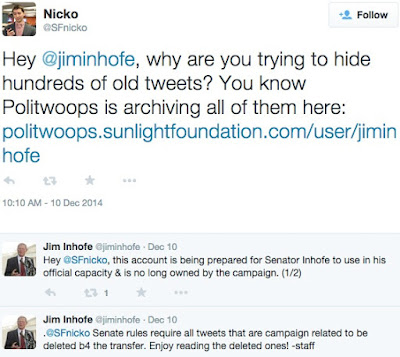Last Friday, Twitter informed Open State Foundation
that it would no longer have the API access necessary to continue Politwoops
and Diplotwoops, platforms that post the deleted tweets of elected officials,
diplomats and embassies in 30 countries including Egypt, India, Tunisia and Turkey. The news was hardly a surprise, given
the suspension of API access to Politwoops US in May, but certainly came as a
disappointment.
 |
| Politwoops US archived campaign tweets, which will no longer be available. [Source: Politwoops] |
Until Friday, Politwoops and Diplotwoops had provided
valuable insight into politics for journalists and everyday citizens alike. Of
note, Politwoops US caught politicians rescinding their praise of Sgt. Bowe
Bergdahl once they discovered that his 5 years of Taliban captivity may have
been initiated by his own desertion and that his freedom came at the cost of
releasing five Taliban detainees. Politwoops US also preserved Senator Nancy Pelosi mistaking the African
continent for a country.
Arjan El Fassed, Open State Foundation’s Director argued, “What elected politicians publicly say is a
matter of public record. Even when tweets are deleted, it’s part of
parliamentary history. These tweets were once posted and later deleted. What
politicians say in public should be available to anyone. This is not about
typos but it is a unique insight on how messages from elected politicians can
change without notice.”
Twitter’s defense of its decision has raised all sorts
of eyebrows and red flags. The statement received by Open State Foundation read in part: “Ultimately, Twitter’s decision was guided by the company’s core value
to “Defend and respect the user’s voice.” The ability to delete one’s
Tweets—for whatever reason—has been a long-standing feature of the Twitter
service. Imagine how nerve-racking—terrifying, even—Tweeting would be if it was
immutable and irrevocable? No one user is more deserving of that ability than
another.” Twitter further claimed that Politwoops and Diplotwoops violate their
developer agreement, which promises to delete content that has been deleted.
Twitter believes that all users should be treated
equally, but established protocols push against this notion. Google’s Right to Be Forgotten, for example, simultaneously protects a citizen’s right to
anonymity and her right to information about public figures. Politwoops and
Diplotwoops share tweets that are considered public information and deserve
protection as such. Many countries guarantee a right to access
of public information--temporary or otherwise--a fact that has pushed Open State Foundation to pursue alternate ways of continuing its deleted tweet project.
If there were a flaw in the Politwoops and
Diplotwoops model, it is not the “nerve-racking terror” imbued by a tweet
living on in perpetuity. It is simply that these platforms have always relied
on Twitter’s willingness to share user data with a third party. Open State
Foundation has used human curation to carefully distinguish between that which
is public and that which is private, but ultimately the platforms represent yet
another example of users signing up for one service and unwittingly feeding
their information elsewhere.
The criticism for Twitter’s latest action far
outweighs the praise, but unfortunately, in a world where legislation has not
caught up with technology, it is ultimately free to do as it likes. Sunlight
Foundation President Chris Gates perhaps summed it up best: “Technology is creating
new and imaginative ways to support a healthy civic discourse, but we clearly
have work left to do to determine how our expectations for public discourse
will play out in privately owned and managed spaces.”

No comments:
Post a Comment